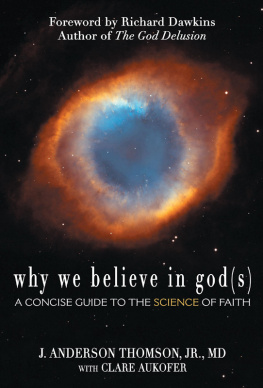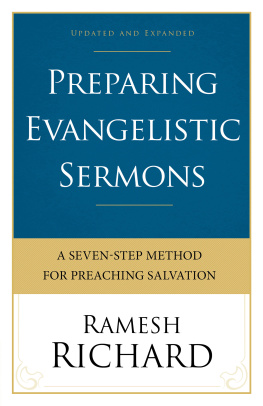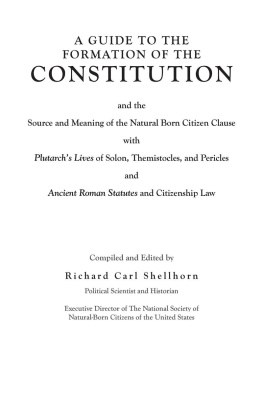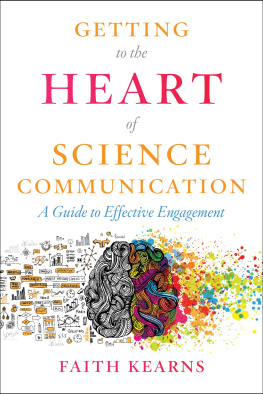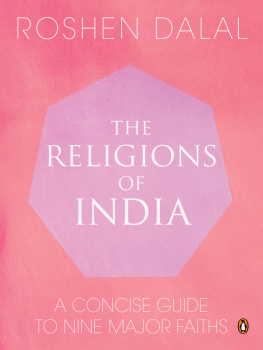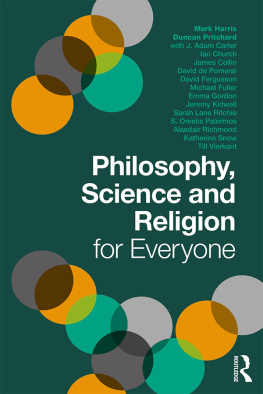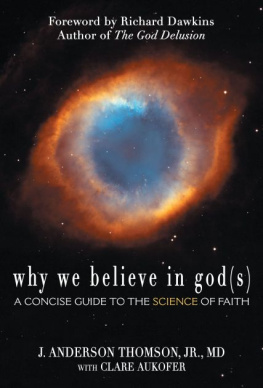Richard - Why we believe in god(s): a concise guide to the science of faith
Here you can read online Richard - Why we believe in god(s): a concise guide to the science of faith full text of the book (entire story) in english for free. Download pdf and epub, get meaning, cover and reviews about this ebook. City: Charlottesville, Va, year: 2011, publisher: Pitchstone Publishing, genre: Religion. Description of the work, (preface) as well as reviews are available. Best literature library LitArk.com created for fans of good reading and offers a wide selection of genres:
Romance novel
Science fiction
Adventure
Detective
Science
History
Home and family
Prose
Art
Politics
Computer
Non-fiction
Religion
Business
Children
Humor
Choose a favorite category and find really read worthwhile books. Enjoy immersion in the world of imagination, feel the emotions of the characters or learn something new for yourself, make an fascinating discovery.
Why we believe in god(s): a concise guide to the science of faith: summary, description and annotation
We offer to read an annotation, description, summary or preface (depends on what the author of the book "Why we believe in god(s): a concise guide to the science of faith" wrote himself). If you haven't found the necessary information about the book — write in the comments, we will try to find it.
Why we believe in god(s): a concise guide to the science of faith — read online for free the complete book (whole text) full work
Below is the text of the book, divided by pages. System saving the place of the last page read, allows you to conveniently read the book "Why we believe in god(s): a concise guide to the science of faith" online for free, without having to search again every time where you left off. Put a bookmark, and you can go to the page where you finished reading at any time.
Font size:
Interval:
Bookmark:
As an amateur woodworker, I can state from experience that theres nothing like having the right tools for the job youre trying to do. Here Andy Thomson and Clare Aukofer have assembled an oh-so-handy tool chest for the layperson who wants to think more clearly about the ever-less-mystical origins of religious belief.
August E. Brunsman IV, Executive Director, Secular Student Alliance
Simply put, this book provides the most compelling scientific explanation for religion ever advanced. Andy Thomson and Clare Aukofer explicate precisely that evolved psychological and brain mechanisms combine to produce religious experiences, and show how religious leaders exploit these mechanisms, sometimes with disastrous results. The book is fascinating from start to finish. Its at the top of my most highly recommended books for 2011.
David M. Buss, author of Evolutionary Psychology: The New Science of the Mind
Despite all the advancements we have made in science, technology, and medicine, our Paleolithic psychology continues to drag us down into the abyss of archaic beliefs, blind faith, and tribal conflict. Andy Thomson and Clare Aukofer explain to us not only why the human mind is so susceptible to believing the unbelievable but also why we are willing to not only die for it, but kill for it as well. Read this book, and when you are donesend it to your congressional representative.
R. Elisabeth Cornwell, PhD, Executive Director, Richard Dawkins Foundation for Reason and Science
As Andy Thomson and Clare Aukofer point out in this compelling little book, our snap judgments are millions of years in the making and so is the human propensity to construct and to believe in gods. I know of no clearer or more concise summary of the various preadaptations that cause us to generate and sustain religious belief.
Sarah B. Hrdy, author of Mother Nature and Mothers and Others: The Evolutionary Origins of Mutual Understanding
In my life Ive seen how desperately we need rational thinking in public policy. This book, dealing with the ultimate issues, can be a framework guiding us to a more rational worldview.
Sean Faircloth, Executive Director, Secular Coalition for America
How does the human brain generate belief in an invisible god? Spurred by his study of suicide terrorism, psychiatrist Andy Thomson and Clare Aukofer elegantly describe many innate capacities of the human brain to explain how we can believe in an unknowable phenomenon: god. The writing is clear, fair, deeply knowledgeable, wickedly intelligent, and full of new scientific facts about how the mind works. This topic touches all of us, from those who wait to pass through airport security to those who live under religious tyranny. Know thy neighbor and thyself; Thomson and Aukofer have given us a smart read.
Helen Fisher, PhD, Biological Anthropologist, Rutgers University, and author of Why Him? Why Her?
Brain washed? Andy Thomson and Clare Aukofer clearly explain why we are so susceptible to religious belief. Priests, rabbis, and imams ask us to dance, and then seduce usand it appears we have a hardwired vulnerability to the seduction. Why We Believe in God(s) is easy and fun to read (and its got pictures). No wonder so much of the world believes the fairy tales.
Woody Kaplan, Chair, Advisory Board of the Secular Coalition for America, and President, Defending Dissent Foundation
A much-needed summary of current research on a fascinating question. Many theists ask how religion could be so pervasive if it isnt true, and this book provides a collection of answers.
Amanda K. Metskas, Executive Director, Camp Quest, Inc.
A stimulating and enlightening journey into the mind we all possess, a mind primed to believe. Andy Thomson and Clare Aukofer take us on a fast-paced trek from how the human brain evolved in a primitive world to how religion harnesses those adaptations in the modern world.
Todd Stiefel, President, Stiefel Freethought Foundation

Pitchstone Publishing
Charlottesville, Virginia 22901
Copyright 2011 by J. Anderson Thomson, Jr., MD, and Clare Aukofer
Foreword copyright by Richard Dawkins
All rights reserved. Published 2011
Printed in the United States of America
18 17 16 15 14 13 12 11 2 3 4 5
Library of Congress Cataloging-in-Publication Data
Thomson, J. Anderson.
Why we believe in god(s) : a concise guide to the science of faith / J. Anderson Thomson, Jr. with Clare Aukofer ; [foreword by Richard Dawkins].
p. cm.
Includes bibliographical references.
ISBN 978-0-9844932-1-0 (pbk. : alk. paper)
ISBN: 9780984493234
1. Psychology, Religious. 2. FaithPsychology. 3. Religion and science. I. Aukofer, Clare. II. Title.
BL53.T46 2011
200.19dc22
2010053504
For Jack, my grandson, in the hopes that he will grow up in a world freer of religions destructiveness
In one of the great understatements of history, The Origin of Species confines its discussion of human evolution to a laconic prophecy: Light will be thrown on the origin of man and his history. Less often quoted is the beginning of the same paragraph: In the distant future I see open fields for far more important researches. Psychology will be based on a new foundation. Dr. Thomson is one of the evolutionary psychologists now making Darwins forecast come true, and this book about the evolutionary drivers of religiosity would have delighted the old man.
Darwin, though not religious in his maturity, understood the religious impulse. He was a benefactor of Down church and he regularly walked his family there on Sundays (then continued his walk while they went inside). He had been trained to the life of a clergyman, and William Paleys Natural Theology was his favored undergraduate reading. Darwin killed natural theologys answer stone dead, but he never lost his preoccupation with its question: the question of function. It is no surprise that he was intrigued by the functional question of religiosity. Why do most people, and all peoples, harbor religious beliefs? Why is to be understood in the special functional sense that we today, though not Darwin himself, would call Darwinian.
How, to put the Darwinian question in modern terms, does religiosity contribute to the survival of genes promoting it? Thomson is a leading proponent of the by-product school of thought: religion itself need have no survival value; it is a by-product of psychological predispositions that have.
Fast food is a leitmotif of the book: if you understand the psychology of fast food, you understand the psychology of religion. Sugar is another good example. It was impossible for our wild ancestors to get enough of it, so we have inherited an open-ended craving that, now that it is easily met, damages our health.
These fast-food cravings are a by-product. And now they become dangerous, because, uncontrolled, they can lead to health problems our ancestors likely never faced.Which brings us to religion.
Another leading evolutionary psychologist, Steven Pinker, explains our love of music in a similar by-product way, as auditory cheesecake, an exquisite confection crafted to tickle the sensitive spots of at least six of our mental faculties. For Pinker, the mental faculties supernormally tickled as a by-product by music are mostly concerned with the sophisticated brain software required to disentangle meaningful sounds (for example, language) from background bedlam. Thomsons fast-food theory of religion emphasizes, rather, those psychological predispositions that can be called
Font size:
Interval:
Bookmark:
Similar books «Why we believe in god(s): a concise guide to the science of faith»
Look at similar books to Why we believe in god(s): a concise guide to the science of faith. We have selected literature similar in name and meaning in the hope of providing readers with more options to find new, interesting, not yet read works.
Discussion, reviews of the book Why we believe in god(s): a concise guide to the science of faith and just readers' own opinions. Leave your comments, write what you think about the work, its meaning or the main characters. Specify what exactly you liked and what you didn't like, and why you think so.

